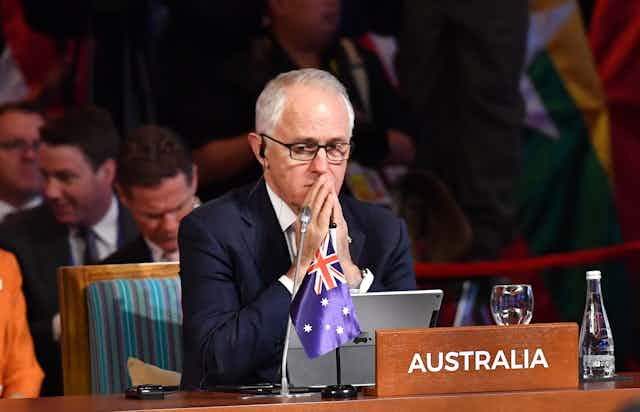Kristina Keneally’s entry into the Bennelong byelection has put more sizzle into a contest already up there as potentially one of the most significant byelections in recent years.
A decade ago Maxine McKew took the Sydney seat from John Howard, in the general election won by Labor.
If Keneally could wrest the electorate once again for Labor, the opposition would inflict a massive blow on the Coalition. Possibly one that would spell the end of Malcolm Turnbull’s leadership. A defeat would, in short, be catastrophic for the government.
On the other hand, if the swing against the Liberals was limited, that would help a besieged government and put some heart into its backbench.
Byelections can be seminal political moments. The Liberals’ loss of the Queensland seat of Ryan in 2001, with a 9.7% swing – the precise margin Bennelong is on – galvanised an embattled Howard. Retaining the Victorian seat of Aston a few months later (with a swing of only 3.7%) was seen as something of a turning point for the government.
In 2015, then prime minister Tony Abbott faced the Canning byelection in Western Australia, with the shadow of Malcolm Turnbull’s ambition hanging over him and warnings of dire consequences if the seat fell. When party polling suggested it would be saved, Turnbull pre-empted a positive result by launching his challenge before polling day.
John Alexander, 66, who fell foul of the dual citizenship crisis so creating this byelection, won Bennelong from McKew in 2010. The one-time tennis star hasn’t reached the frontbench and is rarely in the national news – though he did arc up on housing affordability.
But he is locally active and popular; in the difficult 2016 election he achieved a swing toward him. There had been speculation this might be his last term in parliament – he’d sold his home in the electorate – but now he’s committed to contesting the next election if he wins the byelection. He has said his move was downsizing and that he’s looking for an apartment in the seat.
Appearing with Bill Shorten on Tuesday, Keneally was careful to declare Alexander “a lovely guy”, though sloppy with his paperwork. He has to tie up his renunciation of British citizenship before nominating – presumably the UK bureaucrats are not dawdling.
In tapping Keneally to run, Shorten has both gone for the big hit and taken a gamble. The former NSW premier is well-known, media-savvy and campaign-hardened. She’s most recently worked for Sky; she’s in practice at talking a lot and thinking on the run. In political terms, she’s the quintessential star candidate.
But her background is from the bad times of NSW Labor politics, the days of Eddie Obeid and Ian Macdonald, both in jail, and Joe Tripodi. The Labor premier she displaced, Nathan Rees, said his successor would be a “puppet” of Obeid and Tripodi, to which she retorted “I am nobody’s puppet … I am nobody’s girl”.
The Coalition has an arsenal to use against her, and has immediately started to fire its bullets.
“Don’t let Kristina Keneally do to Bennelong what she did to New South Wales,” Turnbull said from the Philippines. “She is Bill Shorten’s handpicked candidate, so obviously Eddie Obeid and Bill Shorten have formed the same view about Kristina Keneally.” Ministers Greg Hunt and Scott Morrison had similar lines.
At this early stage no-one can be confident in predicting how this battle might go. There are more questions than answers.
To what extent can the Coalition exploit Keneally’s past if voters just want to lodge a protest against the Turnbull government? How far back will memories stretch, especially when there was no suggestion Keneally was corrupt?
Will state issues play into the campaign, and will the contest become more “local” as time goes on? How important will be the ethnic vote, in particular the big local Chinese community? Will voters sympathise with Alexander over his citizenship oversight, or will they mark him down for an unnecessary byelection?
The ABC’s election analyst Antony Green believes that despite the size of the margin “it’s a competitive contest given the polls and given the profile of Labor’s candidate”. As for Keneally’s past, “it’s the baggage of the current federal government that is the issue rather than the baggage of the state Labor government she led six years ago”.
Labor will run a well-resourced campaign. Shorten doesn’t have as much at stake as Turnbull, but once committed to a nationally known candidate and a high-profile campaign he would be burned by a poor Labor showing.
The December 16 Bennelong result will come after the December 2 New England byelection, which will return Barnaby Joyce, and the Queensland state election, where the outcome is uncertain. It will also follow the internal Coalition arm-wrestle over the detail of implementing same-sex marriage.
Each will play into the government’s fortunes, but the Bennelong outcome might be the most important in how Turnbull goes into the new year.

